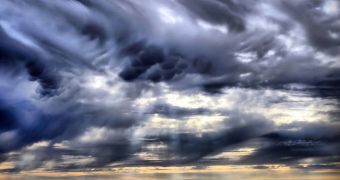The scientific theory that holds that bacteria in clouds may be, to some extent, responsible for rain formation has drawn immense criticism from the scientific community when it first appeared, a good 25 years ago. Ever since, a small number of researchers have continued their investigations into this belief, and the results of their studies, published in prestigious journals, seem to prove their theories. They rely their finds on the fact that water needs to freeze in clouds before it starts raining, but that its purity doesn't allow it to freeze at temperatures even lower than -40 degrees Celsius.
The temperature inside clouds is essential for water formation. But water, in its pure form, does not freeze at 0 degrees Celsius, and can withstand temperatures of about -40 degrees before it freezes. However, the BBC News reports, temperatures inside clouds rarely get to be that low, so the water requires catalysts. Soot from human activities, volcanic eruptions and wildfires, along with dust represent two of the most active factors in rain formation, but they are sometimes not enough.
During their researches, scientists have determined the fact that soot and dust cannot cause water to freeze at relatively high temperatures, such as -5 or -6 degrees Celsius. For this to happen, bacteria were proven to be the best solution. Lab test results show that the microorganisms act as the best ice 'nucleators' out there, in that ice particles form around them, in a process that significantly raises the temperature at which pure water freezes. Theories hold that this phenomenon is responsible for precipitations, at least in temperate areas such as that of Europe.
French National Research Institute for Agriculture Plant Pathologist Cindy Morris has recently proven the fact that bacteria excel at making water freeze. In her lab, the researcher created a tube of water, which she then cooled to about -6 degrees Celsius, without freezing it. Then, she placed a drop of bacterial culture inside the mix, and watched how the water froze completely in less than two seconds. “There's nothing magic about it. You can't break the laws of physics,” Morris said.
“It's a big question. Are [bacteria] involved in the events that lead to rain formation? Because, if they are – these bacteria are the products of agriculture –, does agriculture have any consequence for the amount of rain that could be formed?” she asked.

 14 DAY TRIAL //
14 DAY TRIAL //